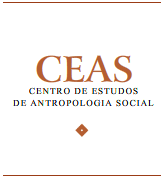 Introduction
Introduction
CEAS was created in 1986 as a non-profit-making organization committed to anthropological research and debate and also to promoting scientific production within the discipline. CEAS is hosted by ISCTE –Lisbon University Institute, a public university in Lisbon, and currently has approximately 300 members.
The Centre is one of the largest research institutions in Portuguese anthropology. It is sponsored by the Programa de Financiamento Plurianual de Unidades de I&D, (Pluri- annual Financing Programme for Research and Development Units) of Fundação para a Ciência e Tecnologia (Foundation for Science and Technology). CEAS hosts several research projects, as well as holders of masters', doctoral and post-doctoral research grants. It also co-sponsors research and outreach activities with other scientific institutions, museums, foundations, NGOs, local and national public institutions and other groups.
CEAS plays a fundamental role in the advancement of anthropology, mainly through its scientific journal, Etnográfica, but also through the organization of symposia, seminars, conferences and other events attended by both Portuguese and foreign researchers.
Since its creation, CEAS has developed research projects in the following areas: environmental resources, industry and labor, elites, death, health and disease, history of Portuguese anthropology, rural and fishing communities, gypsy communities, popular culture, tourism, identities and social differentiation, education, urban studies, anthropology of organizations, colonial and postcolonial studies, migration, ethnicity and transnationalism. These projects have been developed both in foreign contexts (Cabo Verde, São Tomé, Brazil, Spain, USA, Canada, India, East Timor) and in Portuguese regions.
